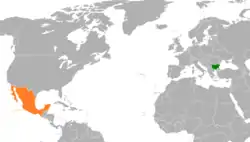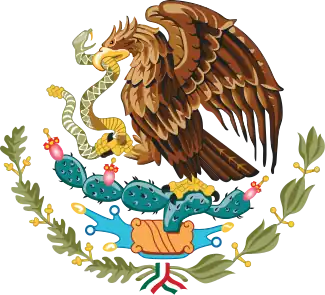Bulgaria–Mexico relations
Bulgaria–Mexico relations are the diplomatic relations between Bulgaria and Mexico. Both nations are mutual members of the United Nations and the World Trade Organization.
 | |
Bulgaria |
Mexico |
|---|---|
History
In 1936, both Bulgaria and Mexico signed a Treaty of Friendship.[1] Diplomatic relations between both nations were established on 6 January 1938.[1] In 1941, during World War II, both nations suspended diplomatic relations when Bulgaria joined the Tripartite Pact (a military alliance between the Axis powers and Bulgaria, among others). In May 1942, Mexico declared war on the Axis powers.[2] Diplomatic relations between both nations were resumed on 11 July 1974.[1] In 1976, both nations opened resident embassies in each other's capitals.
In June 1978, Mexican President José López Portillo paid an official visit to Bulgaria.[3] In 1979, Bulgarian President Todor Zhivkov reciprocated the visit to Mexico.[1] In 1989 Mexico closed its embassy in Sofia due to financial restraints. Since then, relations between both nations have been conducted mainly at United Nations summits. In November 2008, Bulgarian President Georgi Parvanov paid an official visit to Mexico and met with Mexican President Felipe Calderón.[4]
In 2023, both nations celebrated 85 years of diplomatic relations. In celebration, the Mexican Secretariat of Foreign Affairs opened a temporary exhibition on its premise celebrating the history of diplomatic relations between both nations.[5]
High-level visits
High-level visits from Bulgaria to Mexico[1]
- President Todor Zhivkov (1979)
- President Georgi Parvanov (2008)
High-level visits from Mexico to Bulgaria
- President José López Portillo (1978)
Bilateral agreements
Both nations have signed a few bilateral agreements such as an Agreement on Touristic Cooperation (1980); Agreement of a Convention on Consular Relations (1986); Agreement on Scientific and Technical Cooperation (1994) and an Agreement on Cultural and Educational Cooperation (1995). Both nations have also agreed to establish periodical Bilateral Political Consultation Meetings for which they have met in 2002, 2006, 2007 and 2012.[6]
Migration
Although Mexico was not a major destination for Bulgarian migrants; several hundred migrants from Bulgaria immigrated to Mexico in order to travel to the United States in the mid-1960s after the United States passed the Immigration and Nationality Act of 1965 which abolished the quota system based on national origins.[7] More recently, many Bulgarians, primarily women, have been trafficked from their homes mainly with the promise of going to the United States. However, after they arrived in Mexico, they were made to become prostitutes and/or sex slaves.[8]
Trade
In 1997, Mexico signed a Free Trade Agreement with the European Union (which includes Bulgaria). In 2018, trade between Bulgaria and Mexico totaled US$131 million.[9] Bulgaria's main exports to Mexico include: mineral and chemical deposits, fruit seeds, unexposed film and textiles. Mexico's main exports to Bulgaria include: computers, mobile phones and other electronics.[10] Mexican multinational company América Móvil operates in Bulgaria.
Resident diplomatic missions
References
- "Bilateral relations between Mexico and Bulgaria (in Spanish)". Archived from the original on 2016-11-30. Retrieved 2016-11-30.
- Mexico - forgotten World War II ally
- Epitafio de la Revolución (in Spanish)
- "Presidente Georgi Parvanov en México (in Spanish)". Archived from the original on 2013-06-15. Retrieved 2018-11-02.
- México y Bulgaria: 85 años de diplomacia y cooperación en el Museo de la Cancillería (in Spanish)
- Relations between Mexico and Bulgaria (in Spanish)
- Bulgarian Immigration
- Trata de personas; el tercer negocio ilícito que más ganancias deja
- "Mexican Ministry of the Economy: Bulgaria (in Spanish)". Archived from the original on 2019-07-28. Retrieved 2018-03-15.
- Bulgaria en el TLC México - Unión Europea (in Spanish)
- Embassy of Bulgaria in Mexico City (in Bulgarian and English)
- Embassy of Mexico in Budapest, Hungary (in English, Hungarian and Spanish)

